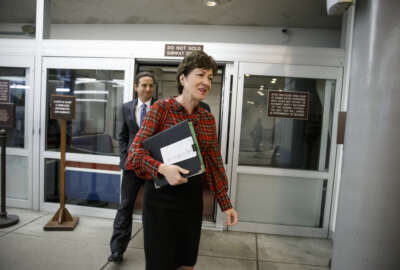
Rollback of DoD’s per diem travel cuts on NDAA bargaining table
The final details of the 2017 defense authorization bill remain a work in progress for the House and Senate, but one bargaining chip of the deal could undo some...
The final details of the 2017 defense authorization bill remain a work in progress for the House and Senate, but one bargaining chip of the deal could undo some steep travel cuts for DoD employees.
The NDAA draft passed by the House Armed Services Committee in April would reverse the diem travel cuts for the defense civilian workforce and military personnel that have been in place since November 2014.
DoD’s change in policy cut travel reimbursement by 25 percent for federal and military personnel on temporary duty assignment lasting longer than 30 days, and cut reimbursement by 45 percent for travel lasting longer than 180 days. The Pentagon instituted the belt-tightening in its travel budget in response to sequestration.
The move to restore the Defense workforce’s per diem travel reimbursement, contained in an amendment by Rep. Mark Takai (D-Hawaii), received praise from unions representing civilian DoD employees — including the American Federation of Government Employees, the National Federation of Federal Employees and the International Federation of Professional & Technical Engineers.
“Basically, DoD employees and our military service members are being penalized for accepting longer-term temporary duty assignments. The result of this is that our civilian [Defense] workforce is having to pay out-of-pocket to travel on official business. I have heard stories of our personnel sleeping in campsites because they couldn’t afford a hotel,” Takai said during a House markup of the bill. “There are instances where longer-term duty assignments are necessary to the needs of our military, and are not simply a choice or a perk. This policy is eroding the morale of the workforce.”
Sheila McCready, a legislative representative with AFGE, said the per diem cuts have disproportionately affected civilian defense workers — like depot workers, shipyard workers and corps of engineers employees, who frequently travel for official business.
“We believe that causes folks to have to pay for their official travel out-of-pocket, and also cause them to also have to reside in substandard accommodations. This is an extremely important provision to our people. Many of these people who travel are mid-level employees who just absolutely cannot afford to pay upfront and be reimbursed later,” McCready told Federal News Radio. “When you start asking civilian and military members to pay out-of-pocket [with] their personal income to pay for official travel, that is absolutely unfair, and it is not the responsibility of individuals to pay for legitimate government expenses.”
But the travel cuts mean more than just dollars and cents. Naval Sea Systems Command (NAVSEA) protested the travel cuts in a letter to DoD’s Office of Civilian Human Resources in January, and requested an immediate blanket waiver on the grounds that the cuts would cost them more in readiness than they would deliver in cost savings.
“It is not just affecting pocketbooks, but it’s affecting military readiness,” McCready said.
AFGE also supported an amendment that would require DoD and the military services to report on skill gaps created as a result of mandatory headquarters cuts in science, technology, engineering, and mathematics (STEM) positions.
“We recognize that we have a number of critical employees in STEM positions who work in headquarters organizations. And so we believe that those front-line people, who are hard to hire, hard to recruit, and are critical to the mission of DoD could be in danger, and we think it’s very important that Congress send the signal … that these are positions that should not be cut as part of headquarters reduction.”
Sens. Susan Collins (R-Maine) and Brian Schatz (D-Hawaii) in December 2015 called on the Senate Appropriations Committee to stop implementing the travel cut policy.
Reps. Derek Kilmer (D-Wash.) and Walter Jones (R-N.C.) in March 2015 introduced a freestanding bill that would also roll back the per diem travel cuts. That bill, however, never left committee.
Copyright © 2024 Federal News Network. All rights reserved. This website is not intended for users located within the European Economic Area.
Jory Heckman is a reporter at Federal News Network covering U.S. Postal Service, IRS, big data and technology issues.
Follow @jheckmanWFED



